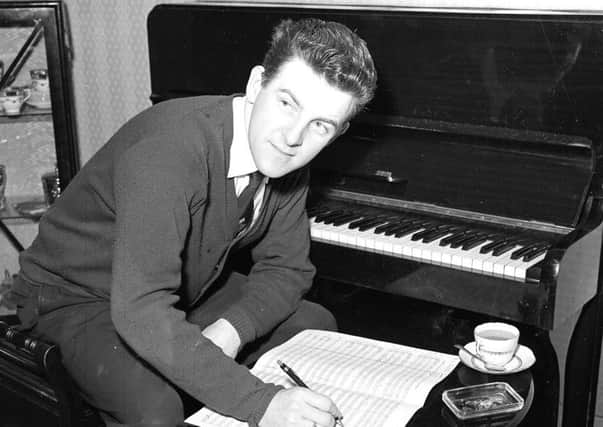Obituary: Johnny Keating, composer and arranger


Johnny Keating, composer and arranger.
Born: 10 September, 1927, in Edinburgh.
Died: 28 May, 2015, in London, aged 87.
Johnny Keating was a Scottish composer and arranger who enjoyed success on both sides of the Atlantic in various guises, most notably for recording the most famous version of the Theme From Z Cars, which hit number five in the UK singles charts in 1962, the same year that the hugely popular British crime drama debuted on the BBC.
Many of his further compositions went on to earn him more esoteric repute, while he also wrote and arranged for popular artists including Adam Faith, Tony Bennett, Bing Crosby, Sammy Davis Jnr and Petula Clark.
Advertisement
Hide AdAdvertisement
Hide AdJohn Keating was born in Bakehouse Close’s Huntly House just off Edinburgh’s Royal Mile in 1927 to his mother Esther (née Aitchison) and father Jock, the local bookmaker.
One of four siblings – the family also included his brother Eric and sisters Moira and Pat – he began to play the piano accordion at a very young age, later teaching himself trombone on the advice of the bandleader at the local Mecca, as it would be a likely way of earning a gig.
Some of Keating’s earliest shows saw him playing in the ever-fluid line-up of the Tommy Sampson orchestra, backing a nationally celebrated big band leader from Dunfermline who gave Keating much of his formative grounding in playing the style.
Among these youthful dates were shows at the Fountainbridge Palais and the now-destroyed Eldorado Ballroom on Mill Lane in Leith, the latter area a home to another of Keating’s lifelong love affairs – Hibernian Football Club.
Beginning his writing career with a song entitled Emily, a tribute to his wife, Keating had some success composing works for Sampson’s band, before going on to attract the attention of Ted Heath, the London-based big band leader, also a trombonist.
Moving to London with his wife in 1952, he played for various bandleaders at the head of the trombone section, then went on to play for Heath, becoming primary arranger for the band, nine of whose members were Scots.
Having some time before turned down the Manchester bandleader Hughie Gibb (father of the Bee Gees), Keating played highly successful dates in New York with Heath.
What set the young Keating apart from many of his peers during this era was that he merged the grounding which the soon-to-become-outdated big band style gave him in jazz composition techniques with a more forward-thinking interest in the fast-emerging pop style of the era.
Advertisement
Hide AdAdvertisement
Hide AdAlongside the songwriter Johnny Worth, who used the pen name Les Vandyke, he helped mastermind the musical style of early 1960s pop heartthrob Eden Kane, including co-writing the 1961 UK number one hit Well I Ask You.
Accounts vary as to the precise compositional lineage of Theme From Z Cars, with many reports stating that it was based on a traditional arrangement of an old folk song named Johnny Todd sung by children in Liverpool, where the series was set.
Musicians Fritz Spiegl and Bridget Fry are also said to have been involved in the arrangement, but it was undoubtedly Keating’s successful chart version which lodged itself most firmly in the public consciousness.
Recorded alongside his orchestra, who also went by the collective name Johnny and the Z-Men, the song was adopted by fans of Liverpool’s Everton Football Club as an unofficial club anthem – precisely why is lost to legend, although one tale has it that one of the cast members was an Evertonian and he used to bring the rest of the performers to see the team on their days off.
The 1960s were a period of great activity for Keating, with his writing and composition credits including popular pieces for Adam Faith, Anthony Newley and Helen Shapiro, while Tony Bennett said that the arrangement for The Very Thought of You was the best he’d sung until that point in his career.
Moving briefly to Hollywood later in the decade, he also earned work as a composer for film on both sides of the Atlantic, scoring Hotel (1967), Robbery (1967) and Innocent Bystanders (1972), and arranging much of the soundtrack of the Warren Beatty comedy Promise Her Anything (1965).
The 1970s saw further diversity of style emerge from the always inquisitive Keating. Even as recordings were released on London Records’ Phase 4 imprint and Columbia, respectively, of him conducting the Royal Philharmonic Orchestra and the London Symphony Orchestra, he would produce the companion pieces Space Experience (1972) and Space Experience 2 (1975), putting him at the forefront of a wave of electronic composition inspired by the Moog synthesiser.
In 1973 he also wrote the double A-side single Hibernian (Give Us a Goal) / Turnbull’s Tornadoes for his old football team. In much later years his song Bunny Hop was used by Tim Burton in the film Ed Wood (1994) and Keating dedicated himself to writing a large, four-volume treatise on the art of songwriting.
Advertisement
Hide AdAdvertisement
Hide AdDespite his extensive travels in service of the music he played, Keating never left Edinburgh behind, founding the Johnny Keating School of Music during a three-year return to the city in the 1960s and returning in later years to visit his parents in Portobello and to watch Hibs play.
He died of natural causes following a period suffering from dementia in London, where he made his home, and is survived by his children Martin, Kevin and Jill – all musicians – as well as his grandchildren. According to Martin, he insisted on being buried wearing his Hibs club tie.
DAVID POLLOCK